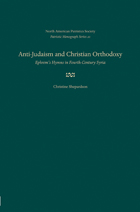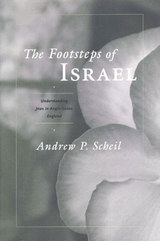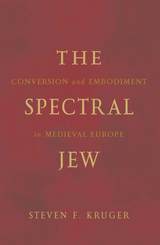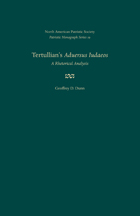5 books about Judaism (Christian theology)

Anti-Judaism and Christian Orthodoxy
Ephrem's Hymns in Fourth-century Syria (Patristic Monograph Series)
Christine Shepardson
Catholic University of America Press, 2008
This book investigates the complex anti-Jewish and anti-Judaizing rhetoric of Ephrem, a fourth-century poet, deacon, and theologian from eastern Roman Syria whose Syriac-language writings remain unfamiliar and linguistically inaccessible to centuries of scholars who study the well-known Greek and Latin writings of his contemporaries.
[more]

The Broken Staff
Judaism through Christian Eyes
Frank E. Manuel
Harvard University Press, 1992

The Footsteps of Israel
Understanding Jews in Anglo-Saxon England
Andrew P. Scheil
University of Michigan Press, 2004
"This innovative, well-researched study looks at anti-Judaic rhetoric in the Old English and Latin texts of Anglo-Saxon England-a land lacking real Jews. The author isolates a common pool of inherited images for portraying the Jew, and teaches us to hear, especially in the vernacular, their increasingly dark and disturbing inflections."
---Roberta Frank, Yale University
"The Footsteps of Israel is a fascinating study of a pervasive stereotype. Scheil's analysis of how Jews, with no real physical presence in Anglo-Saxon England, captured the imagination of writers of the period, is a superb achievement."
---Louise Mirrer, President and CEO, New-York Historical Society
"The elegance of Scheil's prose weaves a unifying thread through the vast literary and historical tapestry he presents, moving with grace from Latin to Old English, from Bede to later authors, from Wordsworth and Blake to modern writers. He speaks elegantly of these texts' conversations with the past, and the Jews emerge as both enemies and spiritual antecedents of the 'New Israel' of Anglo-Saxon England."
---Stephen Spector, State University of New York, Stonybrook
Jews are the omnipresent border-dwellers of medieval culture, a source of powerful metaphors active in the margins of medieval Christianity. This book outlines an important prehistory to later persecutions in England and beyond, yet it also provides a new understanding of the previously unrecognized roles Jews and Judaism played in the construction of social identity in early England.
Andrew P. Scheil approaches the Anglo-Saxon understanding of Jews from a variety of directions, including a survey of the lengthy history of the ideology of England as the New Israel, its sources in late antique texts and its manifestation in both Old English and Latin texts from Anglo-Saxon England. In tandem with this perhaps more sympathetic understanding of the Jews is a darker vision of anti-Judaism, associating the Jews in an emotional fashion with the materiality of the body.
In exploring the complex ramifications of this history, the author is the first to assemble and study references to Jews in Anglo-Saxon culture. For this reason, The Footsteps of Israel will be an important source for Anglo-Saxonists, scholars of late antiquity and the early Middle Ages, scholars of medieval antisemitism in general, students of Jewish history, and medievalists interested in cultural studies.
---Roberta Frank, Yale University
"The Footsteps of Israel is a fascinating study of a pervasive stereotype. Scheil's analysis of how Jews, with no real physical presence in Anglo-Saxon England, captured the imagination of writers of the period, is a superb achievement."
---Louise Mirrer, President and CEO, New-York Historical Society
"The elegance of Scheil's prose weaves a unifying thread through the vast literary and historical tapestry he presents, moving with grace from Latin to Old English, from Bede to later authors, from Wordsworth and Blake to modern writers. He speaks elegantly of these texts' conversations with the past, and the Jews emerge as both enemies and spiritual antecedents of the 'New Israel' of Anglo-Saxon England."
---Stephen Spector, State University of New York, Stonybrook
Jews are the omnipresent border-dwellers of medieval culture, a source of powerful metaphors active in the margins of medieval Christianity. This book outlines an important prehistory to later persecutions in England and beyond, yet it also provides a new understanding of the previously unrecognized roles Jews and Judaism played in the construction of social identity in early England.
Andrew P. Scheil approaches the Anglo-Saxon understanding of Jews from a variety of directions, including a survey of the lengthy history of the ideology of England as the New Israel, its sources in late antique texts and its manifestation in both Old English and Latin texts from Anglo-Saxon England. In tandem with this perhaps more sympathetic understanding of the Jews is a darker vision of anti-Judaism, associating the Jews in an emotional fashion with the materiality of the body.
In exploring the complex ramifications of this history, the author is the first to assemble and study references to Jews in Anglo-Saxon culture. For this reason, The Footsteps of Israel will be an important source for Anglo-Saxonists, scholars of late antiquity and the early Middle Ages, scholars of medieval antisemitism in general, students of Jewish history, and medievalists interested in cultural studies.
[more]

The Spectral Jew
Conversion and Embodiment in Medieval Europe
Steven F. Kruger
University of Minnesota Press, 2006
Medieval European culture encompassed Judaic, Christian, Muslim, and pagan societies, forming a complex matrix of religious belief, identity, and imagination. Through incisive readings of a broad range of medieval texts and informed by poststructuralist, queer, and feminist theories, The Spectral Jew traces the Jewish presence in Western Europe to show how the body, gender, and sexuality were at the root of the construction of medieval religious anxieties, inconsistencies, and instabilities.
Looking closely at how medieval Jewish and Christian identities are distinguished from each other, yet intimately intertwined, Kruger demonstrates how Jews were often corporealized in ways that posited them as inferior to Christians—archaic and incapable of change—even as the two mutually shaped each other. But such attempts to differentiate Jews and Christians were inevitably haunted by the knowledge that Christianity had emerged out of Judaism and was, in its own self-understanding, a community of converts.
Examining the points of contact between Christian and Jewish communities, Kruger discloses the profound paradox of the Jew as different in all ways, yet capable of converting to fully Christian status. He draws from central medieval authors and texts such as Peter Damian, Guibert of Nogent, the Barcelona Disputation, and the Hebrew chronicles of the First Crusade, as well as lesser known writings such as the disputations of Ceuta, Majorca, and Tortosa and the immensely popular Dialogues of Peter Alfonsi.
By putting the conversion narrative at the center of this analysis, Kruger exposes it as a disruption of categories rather than a smooth passage and reveals the prominent role Judaism played in the medieval Christian imagination.
Steven F. Kruger is professor of English and medieval studies at Queens College and the Graduate Center, CUNY. He is author of several books and editor with Glenn Burger of Queering the Middle Ages (Minnesota, 2001).
Looking closely at how medieval Jewish and Christian identities are distinguished from each other, yet intimately intertwined, Kruger demonstrates how Jews were often corporealized in ways that posited them as inferior to Christians—archaic and incapable of change—even as the two mutually shaped each other. But such attempts to differentiate Jews and Christians were inevitably haunted by the knowledge that Christianity had emerged out of Judaism and was, in its own self-understanding, a community of converts.
Examining the points of contact between Christian and Jewish communities, Kruger discloses the profound paradox of the Jew as different in all ways, yet capable of converting to fully Christian status. He draws from central medieval authors and texts such as Peter Damian, Guibert of Nogent, the Barcelona Disputation, and the Hebrew chronicles of the First Crusade, as well as lesser known writings such as the disputations of Ceuta, Majorca, and Tortosa and the immensely popular Dialogues of Peter Alfonsi.
By putting the conversion narrative at the center of this analysis, Kruger exposes it as a disruption of categories rather than a smooth passage and reveals the prominent role Judaism played in the medieval Christian imagination.
Steven F. Kruger is professor of English and medieval studies at Queens College and the Graduate Center, CUNY. He is author of several books and editor with Glenn Burger of Queering the Middle Ages (Minnesota, 2001).
[more]

Tertullian's Aduersus Iudaeos
A Rhetorical Analysis (NAPS Patristic Monograph Series, Volume 19)
Geoffrey D. Dunn
Catholic University of America Press, 2008
Geoffrey D. Dunn is the first scholar to use classical rhetoric as the interpretative tool for analyzing the question of the authorship of Aduersus Iudaeos. He argues that Tertullian structured this work according to the rules of classical rhetoric and employed arguments familiar to anyone with training in oratory
[more]
READERS
Browse our collection.
PUBLISHERS
See BiblioVault's publisher services.
STUDENT SERVICES
Files for college accessibility offices.
UChicago Accessibility Resources
home | accessibility | search | about | contact us
BiblioVault ® 2001 - 2024
The University of Chicago Press









